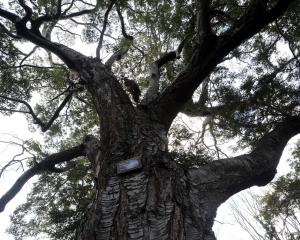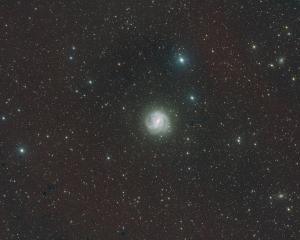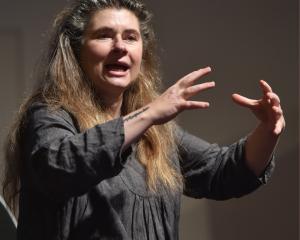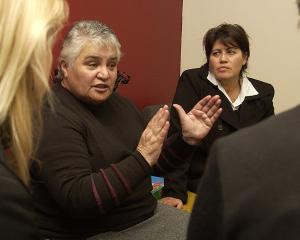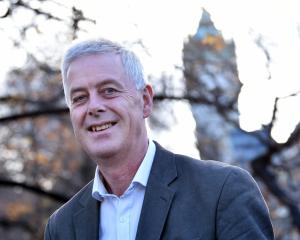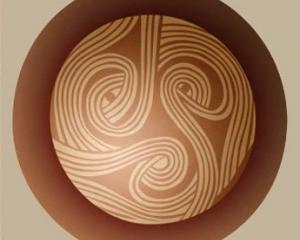A short trip to film pest eradication work on subantarctic Macquarie Island opened Claudia Babirat's eyes to the natural beauty and wildlife of the island. Rebecca Fox reports.
It is cold, wet, constantly windy and gloomy yet that did not stop Dunedin woman Claudia Babirat from falling in love with Macquarie Island.
The 12.5ha land mass governed by Australia in the southwest corner of the Pacific Ocean, about halfway between New Zealand and the Antarctic, has been undergoing one of the world's most comprehensive island pest-eradication programmes.
It was a challenge Ms Babirat's partner Peter Preston, who has worked in pest eradication for about 30 years, could not turn down.
"Island eradication is a niche challenge, one I had not done ... and it's a very cool place, one very few people get to go to let alone get paid to do it," he says.
Not one to let her partner have all the fun, the former Department of Conservation community relations officer and film-maker headed over to join him.
What was supposed to be a short trip to film some of the eradication work turned into nine months as she came to love the island and most especially its wildlife - the penguins, elephant seals, sooty albatross and petrels to name a few - part of the reason it was named a Unesco World Heritage Site in 1997.
She experienced it through the summer, when there was only three hours of darkness daily, winter, when snow blanketed the island for a month, and spring, when many of the penguins and elephant seals returned to the island in their hundreds.
"Seeing it was amazing. I was extremely privileged as not everyone [who visits the island] gets to wander off the tracks and see all parts of the island."
While completing her filming, she also worked as a tour guide during the 15 visits cruise ships made to the island through summer and as a volunteer ranger.
For the last three months of her stay, she joined the hunting teams that she had been filming, but this time as an active participant with Mr Preston as her boss.
Instead of lugging around heavy camera equipment, she carried a 20kg pack, including survival gear, traps and a gun, over the uneven terrain of the island in search of reluctant rabbits.
"You're walking up and down all the time, scrambling over the crags and bluffs, tussock and Macquarie Island cabbage."
The hunting teams - six dog handlers, six hunters and a team leader - were charged with hunting down and eliminating any pests an earlier aerial poisoning operation had not killed.
"You could be scrambling up a bluff and then see a sooty albatross chick snapping its beak, as surprised to see you as you are to see it."
It was those moments that lifted the hard slog, Mr Preston says. The island averages one calm day every six weeks and its average wind speed is 36kmh.
"Week after week of wet and cold, stuck in a tiny hut with another person huddled over one tiny heater could get a bit depressing."
The hunting team spent four weeks out in the field living in field huts - converted water tanks - that provided a "rustic", "back-to-basics" lifestyle including using a bucket for bathing in the freezing cold.
"We baked our own bread, came up with endless dinner combinations of dehydrated and canned foods, and you hand-wash all your clothing," Ms Babirat says.
Macquarie Island's world heritage status means no human waste can be left on the island.
"All our toileting was done on the beach, and waste thrown in the water with a shovel ... It's quite an experience squatting on the beach with big fat elephant seals and walls of inquisitive penguins watching you."
The Macquarie Island Pest Eradication Programme is an ambitious $24.8 million project that aims to remove rabbits, rats and mice from the island. It started with the release of RHD in February last year, followed by an aerial poisoning programme two months later.
Then, in August, the hunting programme began. It had been projected there could be as many as 200 rabbits left from the estimated 150,000 pre-poisoning population, but by the time Ms Babirat, who has a firearms licence and grew up on a Marlborough farm hunting, joined the team, only 13 had been found by the hunters and there was no sign of any rats or mice.
Mr Preston says the last rabbit sighting was in November, so while they cannot say rabbits have been eradicated, it is a good sign.
"To have 99.9% killed by brodifacoum [poison] and RHD was way beyond anyone's expectations. To have just found 13 is amazing."
It is physically hard work.
While the island is not large, it does not necessarily feel that way on the ground, he says. Most days involved an eight- or nine-hour walk. The whole team clocked up 28,847km in nine months.
"There was very little firm footing; it was mostly soft mud and deep grass. There were the feather beds, bogs covered with turf, and we had to walk across it - everyone fell through at some stage up to their knees.
"I'd managed to avoid it until the last month when I went in up to my waist and then you have to lie on your face in the mud to get your legs out of it."
Carting about 20kg, plus the weight of wet-weather gear, meant fitness improved and the group together lost 100kg. A walk Mr Preston did when he first arrived took 4hr 40min but by the time he left he did it in 3hr 40min.
The lack of rabbits did not affect motivation as most of the hunters were there to eradicate the pest and any success in sighting a rabbit excited the whole team.
"At first, they got on the radio and told the world but by the last few they were really casual," Ms Babirat says.
"It was a real team effort."
Ms Babirat did not see a rabbit, which was disappointing from a work point of view but positive for the eradication programme, she says.
In between stints in the field, the groups returned to base for four days to shower, rest and eat some "chef-made food".
Often, the staff there organised theme parties allowing the hunters to let off some steam and have a few laughs.
The small community numbered just 38, including researchers, a chef, doctor and tradesmen, based at a station that includes a mess hall, library and video room, "all the comforts of home".
"You are closer to people living there than you are with some of your friends - you share everything."
The downside is a lack of privacy but it was something Ms Babirat became used to. Those there were a mix of genders and singles and couples.
"There were more relationship things [than disputes]. Two couples got together and two couples split up."
Mr Preston says it was a very close environment. If couples argued there was nowhere to go and no-one to offload to.
"It was good to have the support of your partner but it does test your relationship.
"If you have a barney with your missus, everyone knows about it." People also have to deal with missing friends and family and, for Ms Babirat, trees.
"There are no trees at all, just this tiny woody plant like a coprosma. Seeing a log in tussock one day turned these guys into tree-hugging hippies." There was also a lack of fresh fruit and vegetables although there is a small hydroponic garden.
A perk while Ms Babirat was a tour guide was being able to board visiting cruise ships and take advantage of their fresh supplies.
"We were able to get our fill. It was a special treat."
By the end of Ms Babirat's visit, the island was starting to come back to life as some of the plant species overbrowsed by rabbits and rats began to regenerate.
"It was so gradual you didn't notice it but when I look back at it now I realise how bare it was."
Blue and grey petrels that burrow to breed have also begun to show breeding success.
For Mr Preston, it is that development that will attract him back next year, but probably only for six months.
"Many of the areas were denuded by rabbits but nine months later some of the cabbage was waist deep and you could only see the dog's tail."
Unfortunately, that fantastic vegetation response means his job searching for rabbits will only become harder.
"Some areas may become inaccessible."




